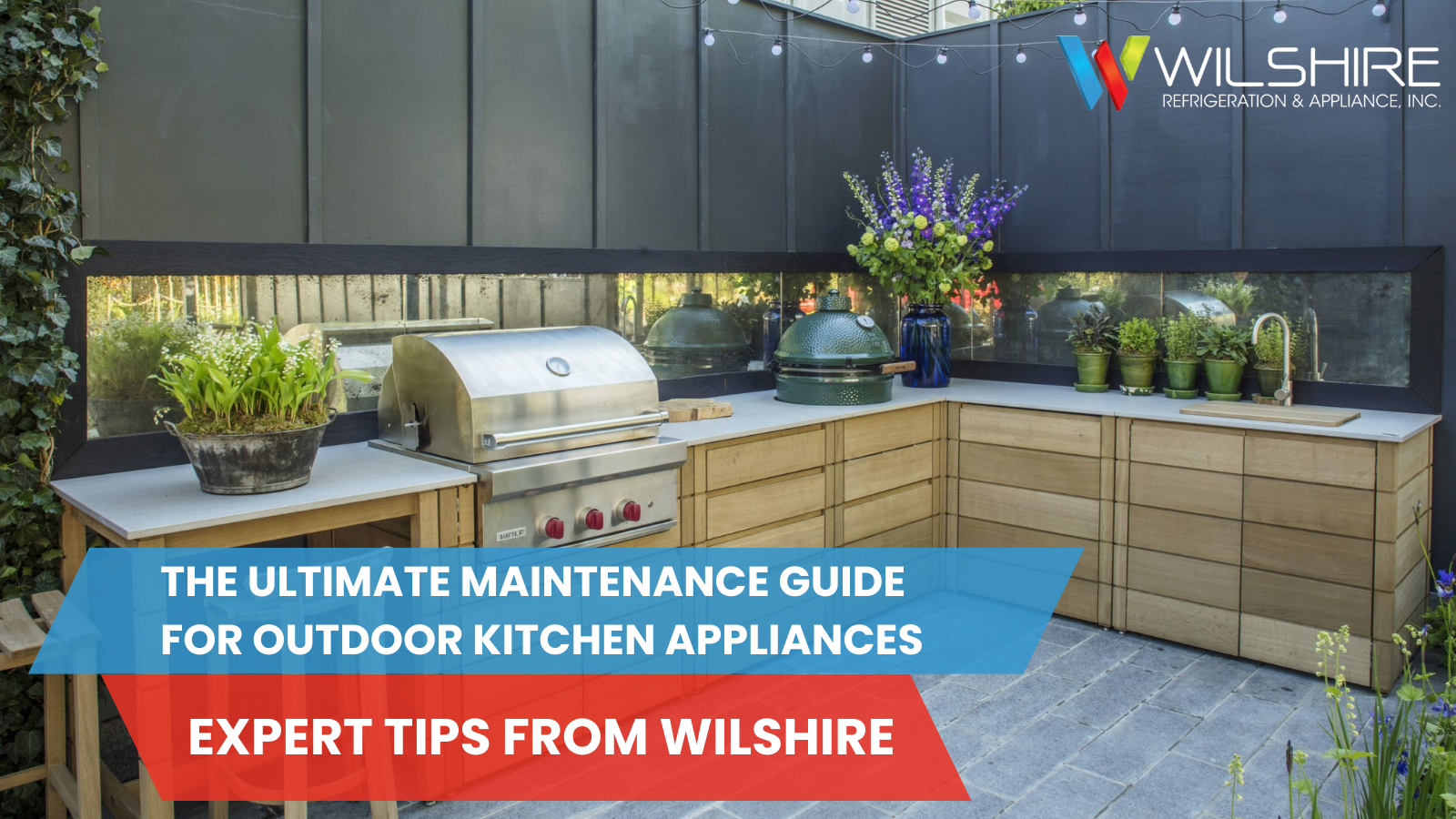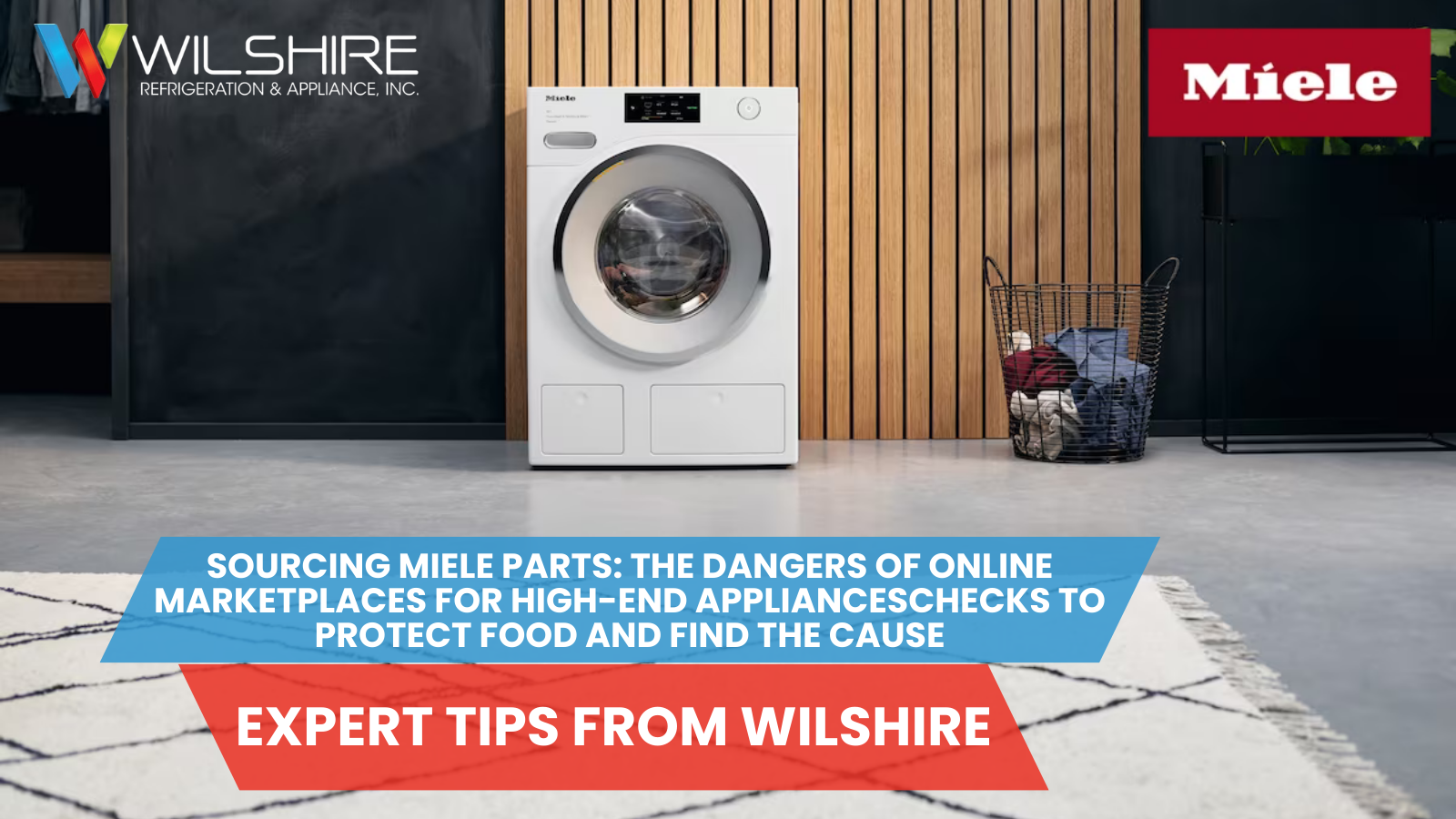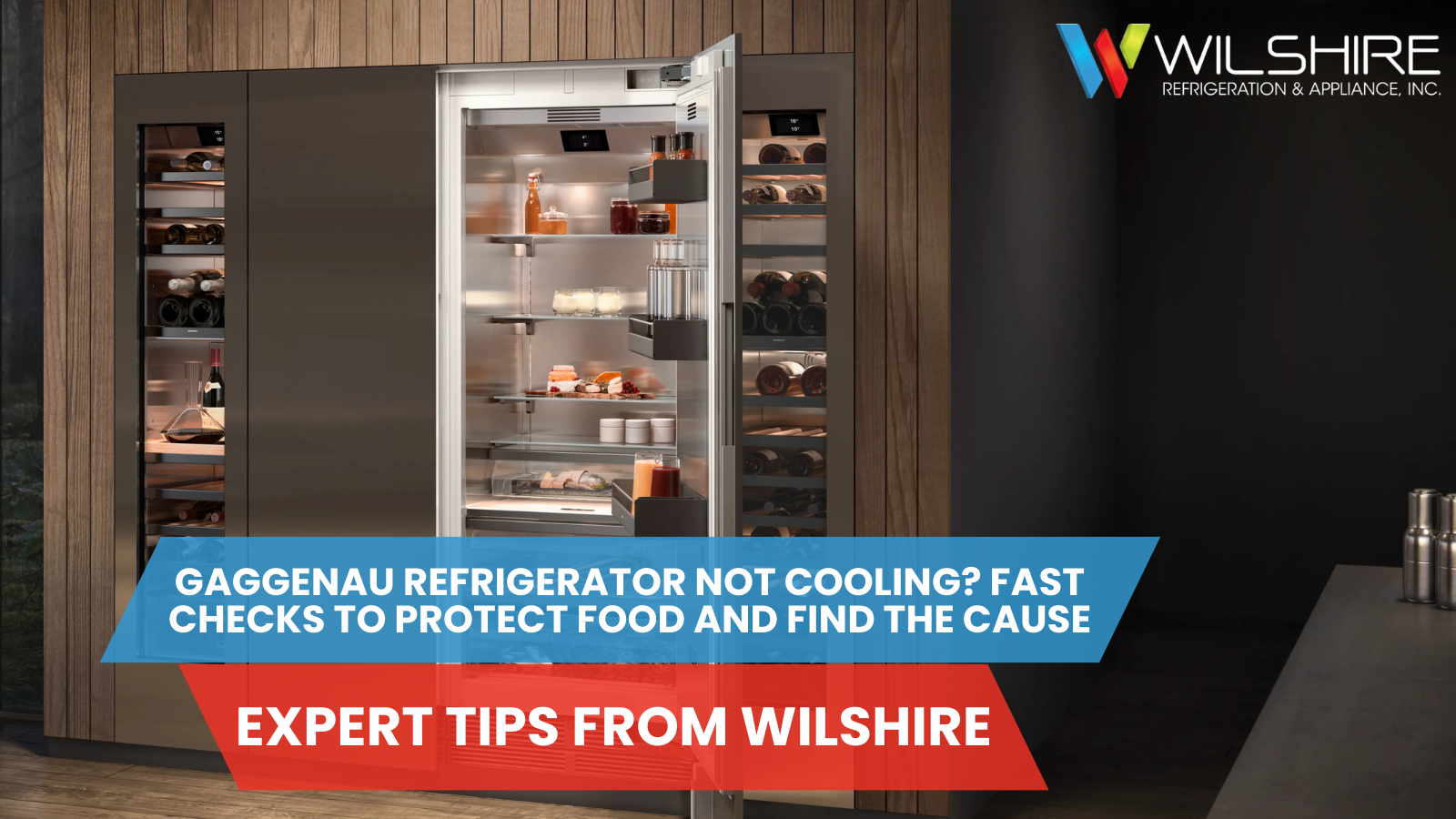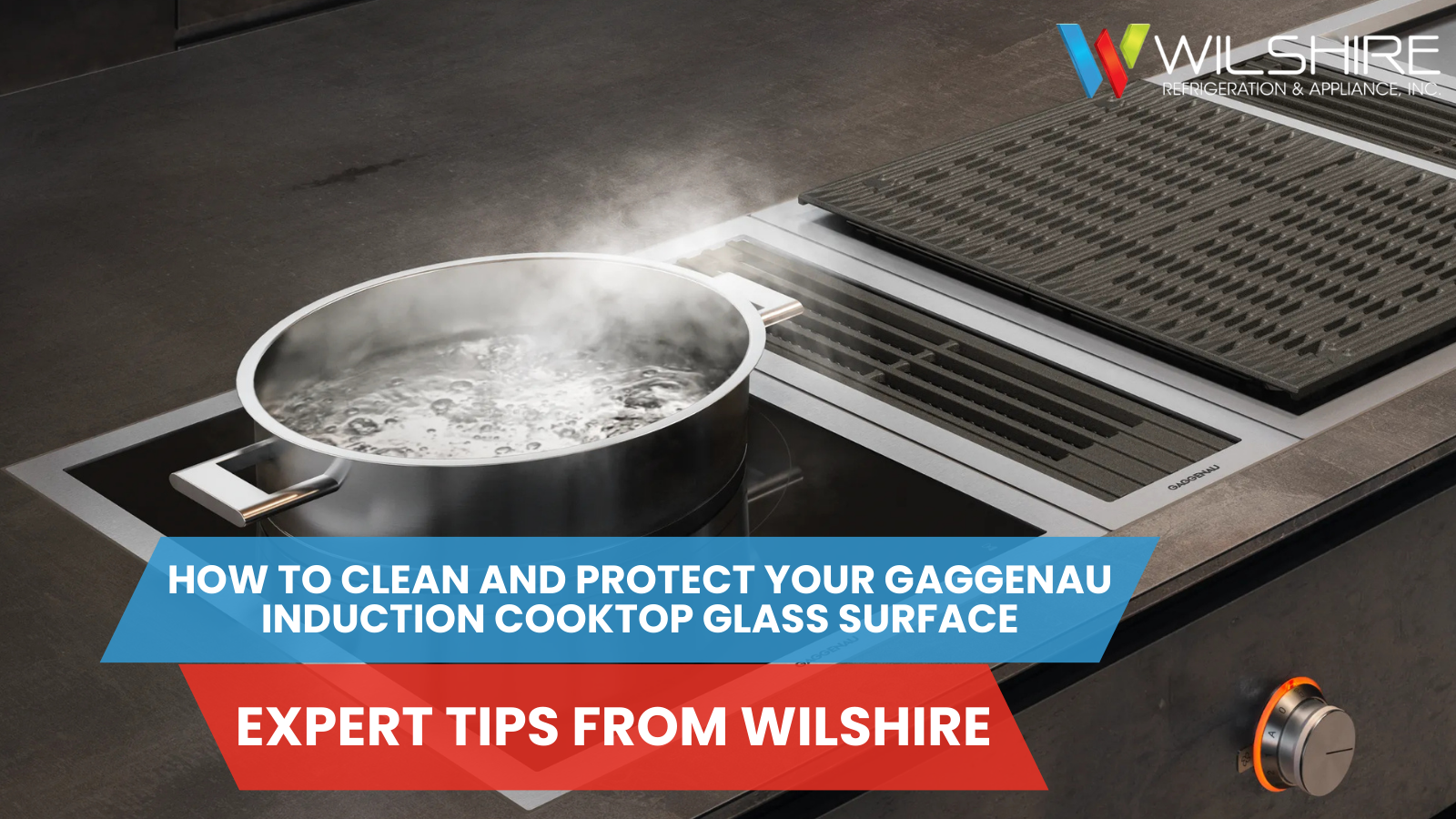Outdoor kitchen appliances are a significant investment that transforms your backyard into a fully functional cooking and entertainment space. However, like any premium equipment, they require regular maintenance to stay in top condition. Keeping your stainless steel grills or built-in ovens clean and well-maintained protects your investment and ensures reliable performance season after season.
In this guide, you’ll learn how to clean each appliance properly, protect surfaces and components, follow seasonal maintenance routines, and extend their life, so your outdoor kitchen continues to run smoothly, regardless of the weather.
What Are Outdoor Kitchen Appliances Made Of
Luxury outdoor kitchen appliances are built to handle the elements, but that doesn’t mean they’re invincible. Materials like stainless steel and stone may look tough, but constant exposure to sun, rain, and salt can wear them down over time. Knowing what your appliances are made of helps you maintain them better and keep them looking new for longer.
Common Materials in Luxury Outdoor Appliances:
- 304 or 316 Stainless Steel: Popular in high-end brands like Wolf appliances; highly resistant to rust and corrosion.
- Powder-Coated Steel: Adds color and protection, but may chip or fade with UV exposure.
- Ceramic or Porcelain-Coated Surfaces: Found in some grills; retains heat well but can crack if not handled carefully.
- Tempered Glass: Used in refrigerator doors or control panels; prone to smudging and needs regular cleaning.
- Natural Stone or Granite Countertops: Heat-resistant and stylish, but porous and needs sealing to prevent staining.
How the Outdoors Affects These Materials Over Time:
- Humidity and Rain: Can cause rust or mildew buildup if appliances aren’t sealed or covered.
- Salt Air (Coastal Areas): Accelerates corrosion, even on stainless steel, especially without regular cleaning.
- Extreme Heat or Cold: Causes materials to expand and contract, potentially cracking surfaces or affecting appliance performance.
- UV Rays: Fade colors, damage finishes, and dry out rubber seals or gaskets.
How Often Should You Clean Outdoor Kitchen Appliances?
Consistent cleaning is the easiest way to keep your outdoor kitchen appliances performing optimally and looking their best. Use this quick guide to stay on top of your maintenance routine.
Here’s what to focus on at each interval:
Weekly:
- Wipe down grills and cooktops after each use
- Clean sink and faucet with mild soap and water
- Empty and wipe refrigerator shelves
- Cover appliances when not in use
Monthly:
- Deep clean grill grates and burners
- Check for signs of rust or corrosion
- Clean exterior surfaces with stainless steel cleaner
- Inspect seals and gaskets for wear
Annually:
- Schedule a professional inspection for gas lines and refrigeration systems
- Reseal stone or granite countertops
- Lubricate hinges, knobs, and drawer slides
- Replace water filters in ice makers or fridges
The Best Cleaning Tools and Products to Use
Using the right tools makes the job faster and safer for your appliances. Here’s what works best:
- Microfiber Cloths: Safe for stainless steel and glass without scratching.
- Non-Abrasive Sponges: Gentle on coated surfaces.
- Stainless Steel Cleaner/Polish: Helps remove streaks and protects against rust.
- Degreaser Spray: Cuts through grill buildup and grease stains.
- Grill Brush with Brass or Nylon Bristles: Effective without damaging grates.
- Mild Dish Soap and Warm Water: Works for most surfaces.
- Vacuum with Hose Attachment: Great for clearing debris around burners or inside storage drawers.
Deep Cleaning Tips for Every Type of Appliance
Surface wipes only go so far. For long-lasting performance, outdoor kitchen appliances require thorough cleaning periodically, especially after heavy use or seasonal changes.
Grills and Smokers
After grilling season, give your units a full breakdown. Remove and soak grates, flavorizer bars, and burners in warm soapy water. Use a grill brush to scrub away carbon buildup and food debris. Clean the inside of the hood and firebox, and don’t forget to empty the grease tray. For smokers, remove ash from the firebox and check seals to ensure no smoke leaks.
Outdoor Refrigerators and Wine Coolers
Unplug the unit and remove all food and drink. Clean shelves and drawers with a baking soda and water solution. Wipe the interior walls with a damp cloth, and vacuum the condenser coils to help it cool efficiently. If you’re near the coast, corrosion can hit faster, so inspect any stainless steel finishes for rust spots and clean with a specialized polish.
Pizza Ovens, Side Burners, and Griddles
Use a scraper to remove food buildup from the oven floor or griddle surface. For pizza ovens, let them cool completely, then sweep out the ash and wipe down the surfaces. Clean burner caps and ports with a non-abrasive brush, ensuring they’re free of grease and obstructions. Avoid using harsh chemicals and opt for food-safe degreasers instead.
Sinks, Faucets, and Ice Makers
Clean sinks and faucets with warm water and mild dish soap. Remove mineral deposits using vinegar if necessary. For ice makers, sanitize the ice bin and run a cleaning cycle if your model includes one. Check and replace water filters as needed, especially in areas with hard water.
Seasonal Outdoor Kitchen Maintenance Checklist
Every season brings different maintenance needs. Use this checklist to stay ahead of the weather.
Winterizing Appliances (Before the Cold Hits)
In colder regions, freezing temperatures can do serious damage. Here’s how to protect your setup:
- Disconnect water lines to prevent freezing and pipe bursts
- Drain sinks, ice makers, and refrigerators
- Cover all appliances with weather-resistant covers
- Shut off and bleed gas lines
- Store removable items like grates or burners indoors
Spring Setup and Inspections
Spring is a great time to inspect, clean, and refresh everything for the season ahead:
- Reconnect water and gas lines
- Test all appliances before regular use
- Deep clean grills, fridges, and surfaces
- Check for rust, leaks, or rodent nests
- Reseal countertops if needed
Summer Use and Safety Tips
Summer brings heavy use, so focus on keeping things clean and safe:
- Wipe down cooking surfaces after each use
- Empty trash and clean around storage areas
- Keep a fire extinguisher nearby
- Ensure proper ventilation for gas appliances
- Inspect cords, igniters, and valves for wear
Autumn Clean-Up and Prep
As the season winds down, take time to prep for less frequent use or winter storage:
- Deep clean all appliances before covering
- Check for any wear and tear after summer
- Remove perishable items from fridges
- Inspect and lubricate moving parts
- Schedule professional servicing if needed
How to Extend the Life of Your Outdoor Kitchen Appliances
With the right protection and regular attention, outdoor kitchen appliances can last well over a decade, even in extreme conditions.
Covers, Shelters, and Shade Structures
Protecting appliances from direct sunlight and heavy rain reduces wear and tear. Invest in custom-fit covers or build a pergola or roof extension to provide shade and shelter. This helps prevent UV damage, water exposure, and keeps your outdoor kitchen usable in all weather.
Upgrading Parts and Preventive Maintenance
Small upgrades, such as replacing worn-out knobs, gaskets, or igniters, can significantly improve performance and safety. Stay on top of preventive tasks like cleaning coils, clearing burners, and inspecting electrical components. These small efforts go a long way in preserving high-end systems like Wolf appliances.
Why Routine Professional Servicing Matters
Even with regular cleaning, outdoor appliances benefit from expert maintenance. A trained technician can inspect gas connections, refrigerant levels, electrical systems, and internal components that are not easily accessible. Scheduling yearly servicing ensures everything runs efficiently and catches minor issues before they become costly repairs.
Frequently Asked Questions
How do I maintain stainless steel appliances in my outdoor kitchen?
Wipe them down regularly with a microfiber cloth and stainless steel cleaner to prevent rust and water spots.
What’s the best way to protect outdoor kitchen appliances in winter?
Shut off water lines, drain appliances, and cover everything with weather-resistant covers.
Can I leave outdoor kitchen appliances outside year-round?
Yes, but they must be covered, cleaned regularly, and serviced annually to avoid weather-related damage.
What’s the ideal cleaning routine for outdoor grills and fridges?
Clean grills after each use and perform a deep clean monthly. Wipe fridges weekly and sanitize shelves monthly.
How long should outdoor kitchen appliances last with proper maintenance?
With regular care and seasonal upkeep, most high-end outdoor appliances can last 10–15 years or longer.
Need Help With Your Outdoor Kitchen Appliances? We’re Just a Call Away
Your outdoor kitchen deserves more than a quick DIY fix. At Wilshire, we specialize in servicing luxury appliances, including Wolf appliances and other high-end brands, with factory-trained precision and expertise. From preventive maintenance to emergency repairs, our team is ready to help you keep your appliances running like new, no matter the season.
Book your service today or call us at (818) 898-9999 for same-day service, and let your backyard keep up with your lifestyle.




